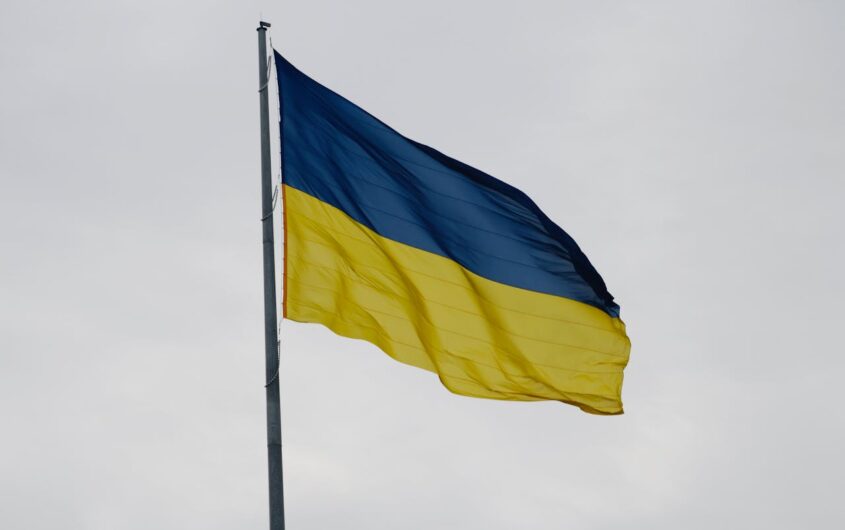
Andrii Smuryhin via Pexels
“Never again Ignore”

Monika Jung-Mounib
Journalist
Monika Jung-Mounib is a German writer and journalist, a former foreign correspondent in Ukraine for Neue Zürcher Zeitung, and a former news editor for Frankfurter Allgemeine Zeitung. Her areas of expertise are Russian-Ukrainian relations, European security, and German memory culture. She is based in Düsseldorf, Germany.
Why supporting Ukraine is a strategic necessity, not simply a moral obligation
Support for Ukraine is a strategic necessity. However, in Germany, support for the beleaguered country is mainly portrayed as a moral obligation. This has been the case since the start of Russia’s full-scale invasion in 2022 as well as during the recent Bundestag election campaign. The latter failed to have a resounding effect on the debate on what policy should be adopted toward Ukraine, and the incoming Christian Democrat (CDU)-led government under Friedrich Merz lacks the mandate it so clearly would need at this historic moment: a clear majority.
Now, amidst the uncertainty around the U.S. commitment to Ukraine and the growing distrust between Europe and the United States, it would benefit Germany’s leading politicians to explain to the war-weary German public why Ukraine matters to Germany as well as to the stability and security of Europe. While foreign and security policy was not a top priority during the election campaign, now is the time that it must be elevated in the public discourse. Without security and stability, there is no prospering economy.
German leaders must convey to the public that Ukraine is and always has been a “terra strategica” in Europe. If German political leaders attach to Ukraine the fully-fledged strategic and military status the war-torn country deserves, it will in the future become easier to muster the political resolve and will of the majority of the German population to give Ukraine what it needs, including various military measures.
The weeks before election day would have presented an opportunity to heed the words of Hans W. Maull,[1] the father of Germany’s foreign policy concept of civilian power, or Zivilmacht. In 2014, he wrote that Zivilmacht was never intended to prohibit the use of military force for defense and deterrence. Acknowledging Maull’s words now would signal that Germany is ready to rethink the foundations of its foreign policy as the country is becoming aware of how the geopolitical weight on the European continent has started shifting eastward. To do that, Germany should add to its particular foreign and security concept of civilian power and to its three core maxims of “never again,” “never again alone,” and “never again Auschwitz” a new maxim: “Never again ignore.”
By deriving its role as an international actor from the country’s asymmetric memory culture, the foundations for the German foreign and security concept are also inherently asymmetric.
The reason for this is obvious: Zivilmacht has failed to provide real security and answer the challenges posed by Russia and Ukraine. For decades, it has shaped the foreign policy attitudes, behaviors, and actions of German policymakers and their communication with German society on these matters. Since Chancellor Kohl managed to secure a peaceful reunification of Germany, the German political elite has been convinced that it was a top priority for Germany to maintain a good relationship with Russia at all costs. This belief became a complacent consensus and produced a continuity in attitude throughout the chancellorships of Schröder, Merkel, and Scholz, albeit with nuanced differences between them. While a decisive change should have occurred in 2014 with the annexation of Crimea, it took the full-scale invasion of Ukraine in February 2022 to shatter this complacent consensus. However, when Scholz realized this consensus was no longer sustainable, he was still reluctant to initiate the change that Germany needed to become a serious European security deterrent. In contrast, Merz, while also being forced into this change but having realized it was an opportunity to challenge Scholz, seems to sense the new existential threat posed by Russia. In addition, given waning U.S. support, it seems to be clear to him now that Germany can no longer afford to display generosity toward Russia. By providing for Germany’s security, the United States allowed Germany to nest into strategic naivety and complacency toward Russia. Consequently, Zivilmacht has become a concept of avoidance with disempowering effects in Germany. “Never again ignore” can overcome this avoidance and muster German determination and clear-sighted empowerment.
“Never again ignore” originates in Germany’s ignorance of Ukraine. It highlights a continuity in German strategic thinking that keeps Ukraine absent. This German attitude has not changed since Ukraine became independent in 1991. “Never again ignore” shows how treating Ukraine as a “terra ignorata” is grounded in the German way of dealing with the Nazi heritage. German memory culture with its message of ‘historical responsibility’ focused on the Holocaust but neglected many victims of the Nazi occupation in the former Soviet Union, in particular the atrocities committed in Ukraine. Thus, it has been incomplete and asymmetric. By deriving its role as an international actor from the country’s asymmetric memory culture, the foundations for the German foreign and security concept are also inherently asymmetric. Ukraine suffered from its role in Nazi strategic and military thinking and the conquest for “Lebensraum.”
The failure of the German political elite today to recognize and fully explain the pivotal strategic role Ukraine plays and has always played for the security of Europe has misled the public debate in Germany. Framing support for Ukraine as a mere question of war and peace does not reflect the true demands of the geopolitical situation. It has rather invoked a false sense of security. As a result, it fails to engage the overall political support of the whole of German society today and plays into the hands of the extreme-right Alternative for Germany (AfD), which invokes simple peace slogans. Furthermore, it stands in the way of achieving what is required in the future: to prepare German society for what is in store, namely a time of frugality to finance some sort of a war economy to withstand Putin’s Russia.
To address this deficit, “never again ignore” offers a lens through which one can comprehend what drives German policymakers not to live up to their ‘historical responsibility.’ While Kohl understood in 1991 that the united countries of Russia and Ukraine would be a threat tantamount to the one of the former Soviet Union and, hence, preferred to put as many smaller states as possible between Russia and Germany to act as a security buffer, the Scholz government avoids acknowledging Ukraine’s deeper strategic importance to the security of Europe both then and now. It stays in line with Zivilmacht and hollows it out at the same time.
“Never again ignore” provides the ideational and intellectual foundation of looking with fresh eyes at the geopolitical landscape of Europe, clearly recognizing the role and weight of Ukraine and smaller Eastern European states. While a strategic culture can change, its direction cannot be determined solely by the external environment. It also demands readiness to be able to take risks. In the case of Germany, dealing with the role of strategy in the face of a Russian military aggression inevitably touches on the role of power, strength, and military force. “Never again ignore,” therefore, addresses the deep-seated German ‘fear of losing one’s innocence again’ around the use of force. It invites Germans today instead to choose to be measured by their own deeds and not by those of their Nazi ancestors and thereby enables them to emancipate themselves from their Nazi heritage and empower themselves.
“Never again ignore” provides the ideational and intellectual foundation of looking with fresh eyes at the geopolitical landscape of Europe.
“Never again ignore” not only works as a strong moral and normative foundation for a new German foreign and security policy, but it also has the power to spur potent action by reversing the decades-long orthodoxy held up by the majority of the German political elite that placed primacy on the relationship with Moscow. Against that, “never again ignore” resets the focus of German foreign and security policy to start looking at the East through a new lens: Peace with Moscow must inevitably go through Kyiv.
Adopting “never again ignore” would lead to a more robust German military commitment toward Ukraine backed up by action. This should translate into more air defense for Ukraine to protect its civilians and its critical infrastructure. Second, a new Chancellor Merz should deliver Taurus cruise missiles to Ukraine as he has promised on various occasions to defend Ukrainian territorial sovereignty. Thirdly, Ukraine should be acknowledged as a strategic challenge to Russia. This could be mirrored in redrawing defense plans for Europe which adequately foresee the role Ukraine will play. Fourthly, “never again ignore” could eventually evolve into a physical German commitment to Ukraine, namely placing German troops in Ukraine. While this represents a highly sensitive and risky issue as it would mean a greater deployment than in the Balkans and a more symbolic and politically sensitive deployment than in Afghanistan, beginning this debate in Germany would already mark a significant change in itself.
Action spurred by “never again ignore” should establish a meaningful and muscular ‘special relationship’ with Kyiv. Berlin and Kyiv have similar historical experiences, having been under Soviet occupation during the Cold War. Berlin should back Kyiv with political and economic support and acknowledge that Ukraine is just as important to German security as Russia. In practice, the new maxim would prepare German policymakers to take up, for example, the idea of former Ukrainian foreign minister Borys Tarasyuk, who in 1994 proposed to form a ‘security arc’ between Germany, Poland, and Ukraine.[2] Thirty years later, Poland and Ukraine are set to become the two major future European military powers. Inviting Britain, France, and Italy to join would turn the ‘security arc’ into a credible deterrent in Europe. Over time, Germany could even give a new life to its Zivilmacht. In addition, it should help Ukraine with the peace negotiations, support the war-torn country on its pathway to becoming a member of the European Union, and help with the reconstruction of the country. No other country than Germany knows better how essential American Marshall Plan aid after the Second World War was to rebuild the country.
“Never again ignore” can act as a positive foundation to help Germans overcome the constraints of Zivilmacht and to turn their historical legacy into positive action, whilst maintaining the moral awareness for the right lessons to be drawn from their burdensome history. Creating and securing an institutionalized connection between Ukraine and the West, be it in NATO or the EU, would be a step for the new chancellor, Friedrich Merz, and his CDU to signal to its partners that Germany is ready to prove it is willing to take on a leadership role for the benefit of Europe’s security. By overcoming its fear of strategic reality, it would also start to build its own heritage for generations to come.
[1] Hanns W. Maull, “Lehren aus der Ukrainekrise: Der Stellenwert des Militärischen,” Stiftung für Wissenschaft und Politik, May 22, 2014. “It is wrong and possibly dangerous in the current crisis to brand any military reaction as a step towards escalation or warmongering. The commonplace that there is no alternative to political solutions should be phased out as quickly as possible.”
[2] Monika Jung,“A New Concept of European Security,” Transition 28, no. 13 (July 1995).








